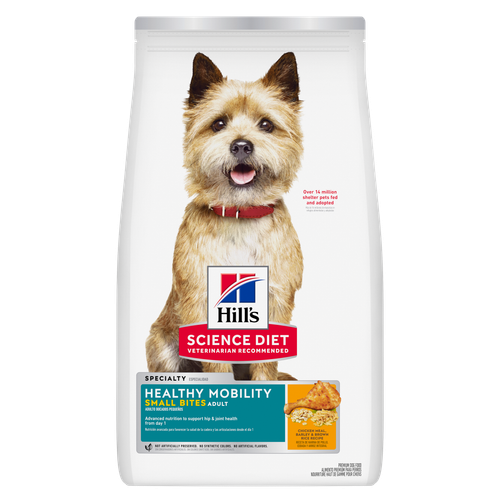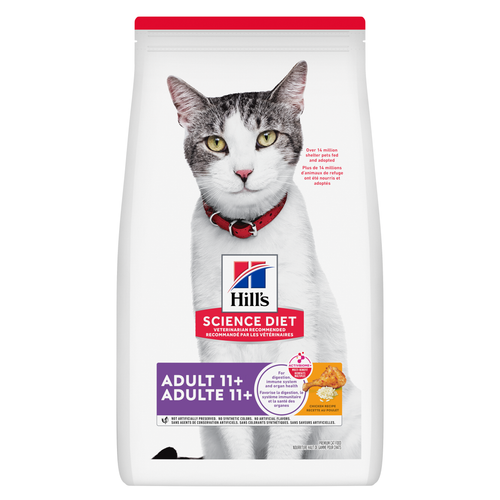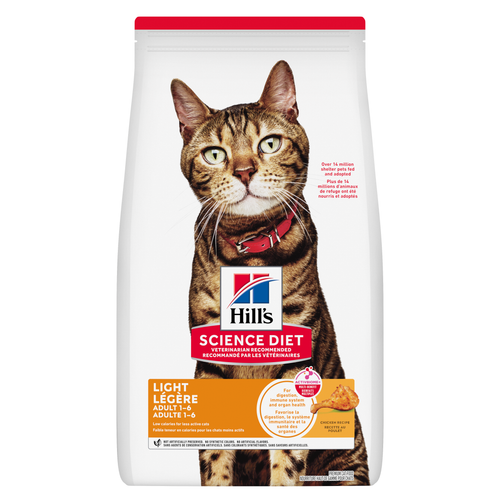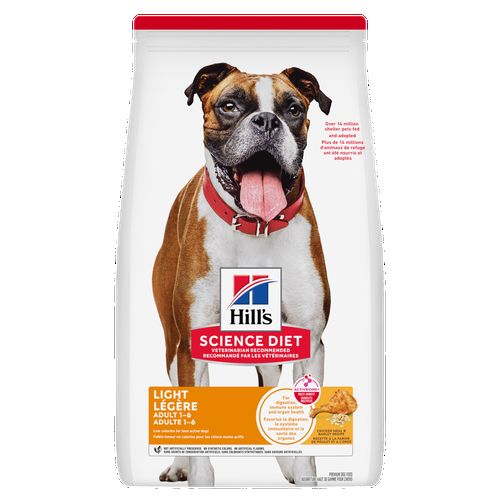
-
Find the right food for your petTake this quiz to see which food may be the best for your furry friend.Find the right food for your petTake this quiz to see which food may be the best for your furry friend.Featured products
 Adult Healthy Mobility Small Bites Chicken Meal, Barley & Brown Rice Recipe Dog Food
Adult Healthy Mobility Small Bites Chicken Meal, Barley & Brown Rice Recipe Dog FoodAdvanced nutrition to support hip & joint health from day 1
Shop Now Adult Sensitive Stomach & Skin Small & Mini Chicken Recipe Dog Food
Adult Sensitive Stomach & Skin Small & Mini Chicken Recipe Dog FoodHill's Science Diet Sensitive Stomach & Skin Small & Mini dry dog food is tailored nutrition for Small & Mini dogs while being gentle on stomachs. Nourishes skin & promotes a lustrous coat.
Shop Now Adult Light Large Breed Chicken Meal & Barley Recipe Dog Food
Adult Light Large Breed Chicken Meal & Barley Recipe Dog Food18% lower calories vs. Science Diet Large Breed Adult
Shop NowFeatured products Adult 11+ Chicken Recipe Cat Food
Adult 11+ Chicken Recipe Cat FoodSupports brain health & beautiful fur. Helps keep immune system, heart & kidneys healthy.
Shop Now Adult Light Chicken Recipe Cat Food
Adult Light Chicken Recipe Cat Food20% lower calories vs. Hill's Science Diet Adult
Shop Now Adult Healthy Cuisine Seared Tuna & Carrot Medley Cat Food
Adult Healthy Cuisine Seared Tuna & Carrot Medley Cat FoodDelicious seared tuna paired with tender carrots in a mouthwatering sauce
Shop Now -
Dog
- Dog Tips & Articles
-
Health Category
- Weight
- Food & Environmental Sensitivities
- Urinary
- Digestive
- Joint
- Kidney
- Dental
- Cancer
-
Life Stage
- Puppy Nutrition
- Adult Nutrition
- Senior Nutrition
Cat- Cat Tips & Articles
-
Health Category
- Weight
- Skin & Food Sensitivities
- Urinary
- Digestive
- Kidney
- Dental
- Stress
- Cancer
-
Life Stage
- Kitten Nutrition
- Adult Nutrition
Featured articles Water
WaterDiscover why water is the most important nutrient for your dog or cat to live a healthy life. Find out how much water your pet should consume each day.
Read More Antioxidants
AntioxidantsUnderstand the importance of antioxidants in your dog or cat's food, and how they can help protect your pet and keep them healthy.
Read More Importance of DHA in your Pet's Food
Importance of DHA in your Pet's FoodLearn about DHA, Docosahexaenoic Acid, a natural omega-3 fatty acid that is essential in the development of the brain and nervous system in cats & dogs.
Read More -


It's a beautiful day, so you decide to leave your dog in your fenced yard while you do some work inside. You know they'll be happy to spend time outdoors.
But when you come outside to check on them, your dog isn't there. Escaping dogs weren't part of the day's plan! Thankfully, you find them trotting down the sidewalk just a couple blocks from your home. But how can you prevent this from happening again?
Read on to learn why your dog might roam and how to keep a dog from escaping the yard, so you can feel safe leaving them outside.
Why Dogs Escape
Dogs are curious creatures. If your dog escaped, they probably wanted to follow something they saw, whether an animal, a person or a car. They wanted to know more and were willing to travel to find out!
While all dogs are capable of escaping, breeds that are known to be diggers or jumpers, like Siberian huskies and border collies, are more likely to break free from a dog enclosure. Similarly, breeds that are hunters, such as the rat terrier, who is also a skilled digger, are especially prone to chase a squirrel or other critter out of the yard.

How Dogs Escape
You have seemingly airtight fencing, so how is it possible your dog managed to escape?
Dogs attain freedom in a few ways: They can either jump over, climb or dig under a fence to get out. Think jumping is impossible? Some dogs can scale an entire fence on their own. Others use climbing aids, like outdoor tables or chairs, to propel them over.
If your fence isn't sturdy enough, your dog could also squeeze through loose panels or knock over broken boards. Especially clever dogs can even paw at a latch and open a fence gate.
As much as we'd like to avoid this, human error can also create the ideal conditions for escaping dogs. If you forget to shut the fence gate, for example, you make it a lot easier for your dog to get loose.


Tasty Tips
How to Keep a Dog From Escaping the Yard
If your dog has ever gotten loose, you know how frightening and stressful it is. But there are steps you can take to limit the possibility of your dog escaping:
- Set aside time to inspect your yard and fencing to make sure there aren't any opportunities for escaping dogs. Look for holes underneath and on the fence, as well as any climbing aids that could help your dog scale the fence.
- If you're dealing with a jumper, the American Kennel Club recommends installing a coyote roller, an aluminum rod that goes at the top of a fence and can stop your dog from getting the leverage to pull themselves over.
- Consider building, or hiring someone to build, a dog run, a locked and fenced area of the yard where your pet can roam as they please.
- Before leaving your dog in the yard, take them on a long walk or provide them with some other form of exercise. Leave them with toys to play with, too. If your pup is occupied and has spent a lot of their energy by the time you leave them, they're a lot less likely to be interested in or have the energy for escaping.
- Consider just spending the time outside with them. If it is raining or it is to just let them outside, you can stand at the door and watch, calling on them if you notice they're getting ready to try and chase a critter out of the yard.
If your dog does escape, the American Kennel Club recommends that you don't punish them: "This will not eliminate his desire to escape, and it may make him afraid to return to the yard."
If they escape even though you've taken steps to secure your fence and have tried the other above suggestions, reach out to your dog's veterinarian for their help. Some professional behavioral training may go a long way to help your dog understand what is acceptable behavior.


Erin Ollila believes in the power of words and how a message can inform—and even transform—its intended audience. Her writing can be found all over the internet and in print, and includes interviews, ghostwriting, blog posts, and creative nonfiction. Erin is a geek for SEO and all things social media. She graduated from Fairfield University with an M.F.A. in Creative Writing. Reach out to her on Twitter @ReinventingErin or learn more about her at http://erinollila.com.
Related products

Advanced nutrition to support hip & joint health from day 1

18% lower calories vs. Science Diet Adult

Hill's Science Diet Sensitive Stomach & Skin Small & Mini dry dog food is tailored nutrition for Small & Mini dogs while being gentle on stomachs. Nourishes skin & promotes a lustrous coat.

18% lower calories vs. Science Diet Large Breed Adult
Related articles

Learn basic steps & precautions for treating a cut on your dog, including what you can put on the cut, and when you should take them to the vet.

Learn how dogs with sensitive skin can have special dietary needs, how they can develop over time in a healthy dog, and how Hill's dog food can help.

Discover how the field of dog science is giving us more and more insights into the inner workings of our furry best friends.

Your dog's coat and skin are a big part of your dog's overall health. Ensure you keep your dog's coat healthy, by following these simple tips.

Put your dog on a diet without them knowing
Our low calorie formula helps you control your dog's weight. It's packed with high-quality protein for building lean muscles, and made with purposeful ingredients for a flavorful, nutritious meal. Clinically proven antioxidants, Vitamin C+E, help promote a healthy immune system.
Put your dog on a diet without them knowing
Our low calorie formula helps you control your dog's weight. It's packed with high-quality protein for building lean muscles, and made with purposeful ingredients for a flavorful, nutritious meal. Clinically proven antioxidants, Vitamin C+E, help promote a healthy immune system.

